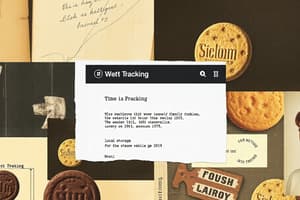Podcast
Questions and Answers
What is the primary purpose of web tracking?
What is the primary purpose of web tracking?
- To collect and analyze user activity on the internet (correct)
- To enhance website design and aesthetics
- To safeguard user information from hackers
- To improve internet speed and performance
Which of the following is NOT a type of information collected through web tracking?
Which of the following is NOT a type of information collected through web tracking?
- The pages you visit
- The types of shoes you prefer (correct)
- Your search queries
- How long you stay on each page
What distinguishes a session cookie from a persistent cookie?
What distinguishes a session cookie from a persistent cookie?
- Persistent cookies are used only for advertising.
- Session cookies can store larger data than persistent cookies.
- Session cookies are temporary, while persistent cookies remain after the browser is closed. (correct)
- Persistent cookies are deleted when you close your browser.
Which technology allows websites to store larger amounts of data on a user's device compared to cookies?
Which technology allows websites to store larger amounts of data on a user's device compared to cookies?
Why might third-party cookies be used by marketing companies?
Why might third-party cookies be used by marketing companies?
What type of information could a web tracking system potentially use to build a profile of a user?
What type of information could a web tracking system potentially use to build a profile of a user?
How do marketing agencies benefit from web tracking?
How do marketing agencies benefit from web tracking?
What aspect of a user's online activities do cookies primarily help with?
What aspect of a user's online activities do cookies primarily help with?
What is one major privacy concern associated with web tracking?
What is one major privacy concern associated with web tracking?
Which of the following can be a consequence of data breaches due to extensive data collection?
Which of the following can be a consequence of data breaches due to extensive data collection?
What is the term used to describe the phenomenon where users are only exposed to information that aligns with their views?
What is the term used to describe the phenomenon where users are only exposed to information that aligns with their views?
What tool should you consider using to limit web tracking when browsing?
What tool should you consider using to limit web tracking when browsing?
Which practice can help reduce the amount of data available to trackers?
Which practice can help reduce the amount of data available to trackers?
What does using a VPN help with in terms of web tracking?
What does using a VPN help with in terms of web tracking?
What is a potential downside of using ad blockers?
What is a potential downside of using ad blockers?
Why is it important to read privacy policies and cookie notices on websites?
Why is it important to read privacy policies and cookie notices on websites?
What is required by the GDPR before websites can track users?
What is required by the GDPR before websites can track users?
Which of the following is NOT a benefit of web tracking?
Which of the following is NOT a benefit of web tracking?
What right do users have under GDPR regarding their data?
What right do users have under GDPR regarding their data?
Which tracking method is considered harder to detect and regulate?
Which tracking method is considered harder to detect and regulate?
Which of the following is a challenge in enforcing web tracking regulations?
Which of the following is a challenge in enforcing web tracking regulations?
What is a common misconception about personalized advertising?
What is a common misconception about personalized advertising?
What could be a nefarious purpose of web tracking?
What could be a nefarious purpose of web tracking?
Why might users give blanket consent to data tracking?
Why might users give blanket consent to data tracking?
What is the primary advantage of using local storage over cookies for web data storage?
What is the primary advantage of using local storage over cookies for web data storage?
What does a heat map visualize on a webpage?
What does a heat map visualize on a webpage?
Which of the following describes the function of web beacons?
Which of the following describes the function of web beacons?
What is a major concern regarding digital fingerprinting?
What is a major concern regarding digital fingerprinting?
How does the extent of web tracking compare to user awareness?
How does the extent of web tracking compare to user awareness?
What type of information can web beacons collect when a user interacts with a page?
What type of information can web beacons collect when a user interacts with a page?
Which of the following factors is NOT part of digital fingerprinting?
Which of the following factors is NOT part of digital fingerprinting?
What does the combination of data points in digital fingerprinting create?
What does the combination of data points in digital fingerprinting create?
Flashcards are hidden until you start studying
Study Notes
Introduction to Web Tracking
- Web tracking involves monitoring and collecting information about user behavior online.
- It creates a digital profile based on activities such as pages visited, time spent, clicks, searches, and purchases.
- Data collected can include user location and device/browser type.
Types of Web Tracking Technologies
- Cookies:
- Small text files stored on devices, distinguishing between session (temporary) and persistent (long-lasting) cookies.
- Essential for functionality but often used for tracking user behavior across websites.
- Local Storage:
- Allows larger data storage compared to cookies without sending data with each request.
- Utilized for user preferences and offline data storage.
- Heat Maps:
- Visual representation of user interactions on webpages, showing areas of engagement through color-coded data.
- Helps website owners enhance user experience based on interaction patterns.
- Web Beacons:
- Invisible images that track user engagement and send back data like IP address and browser type.
- Effective across platforms and not limited by cookie settings.
- Digital Fingerprinting:
- Combining various data points to create a unique identifier for devices.
- Difficult to detect and prevent, tracking users even in private browsing.
Extent and Impact of Web Tracking
- Major companies like Google have trackers enabled on around 80% of websites.
- Information collected is used for personalized advertising, market research, user experience optimization, and potentially malicious purposes.
- Raises significant concerns regarding data privacy and security.
Legal Aspects of Web Tracking
- GDPR in the EU mandates consent for tracking, informing users about data collection and usage, and granting access and deletion rights.
- Many users often consent without understanding details.
- Enforcement of regulations remains challenging, with some tracking methods eluding regulation.
Pros and Cons of Web Tracking
- Benefits:
- Enables personalized user experiences and improved website functionality.
- Provides relevant advertisements and can help in fraud detection.
- Drawbacks:
- Raises privacy concerns due to invasive data collection.
- Increased risk of data breaches and potential manipulation (e.g., political ads).
- Can lead to filter bubbles, affecting the diversity of information consumed.
Protecting Your Privacy
- Use privacy-oriented browsers (e.g., Brave) and search engines (e.g., DuckDuckGo) to reduce tracking.
- Install tracker-blocking tools (e.g., uBlock Origin, Privacy Badger) to prevent data collection.
- Regularly clear cookies and browsing history to limit tracking data.
- Be cautious about personal information shared online to minimize exposure.
- Utilize VPNs to mask IP addresses against tracking.
- Adjust browser settings to block third-party cookies and send "Do Not Track" requests.
- Read and understand website privacy policies and cookie notices to make informed consent decisions.
Conclusion
- Web tracking serves to enhance user experiences and personalize content, but poses significant privacy risks.
- Awareness and proactive measures are crucial for internet users to protect their privacy rights in the digital landscape.
Studying That Suits You
Use AI to generate personalized quizzes and flashcards to suit your learning preferences.




